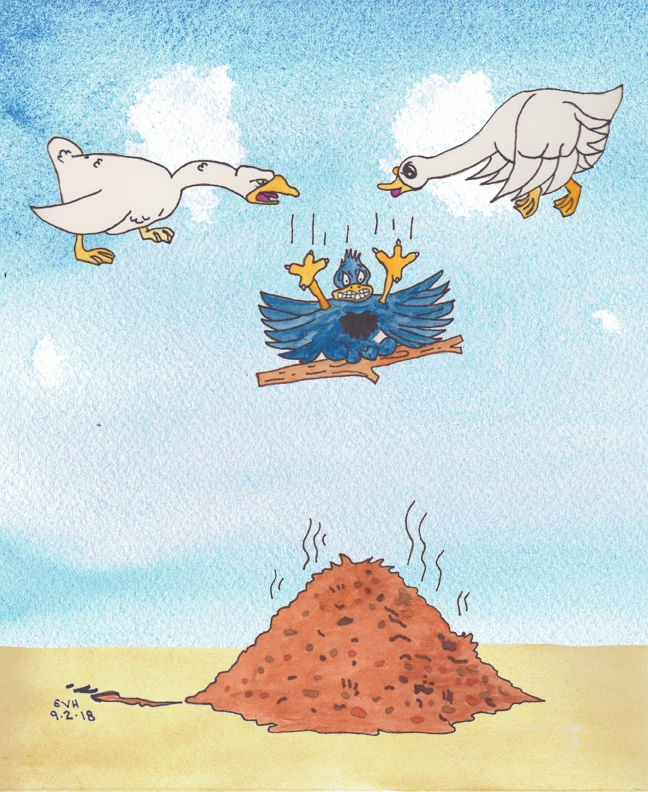
Jataka 160
Vinīlika Jātaka
Blue-black
as told by Eric Van Horn
originally translated by William Henry Denham Rouse, Cambridge University
originally edited by Professor Edward Byles Cowell, Cambridge University
After a while you begin to feel sorry for Devadatta. He is surely the favorite punching bag of early Buddhism. In this story he gets dumped into a pile of manure!
“As yonder king goes galloping.” The Master told this story during a visit to Veḷuvana (the Bamboo Forest Monastery in Rajagaha). It is about how Devadatta imitated the Buddha.
The two chief disciples (Sāriputta and Moggallāna) went to visit Gayāsīsa (A mountain near Gayā in Behar. It is now called “Brahmayoni.” The Buddha gave the Adittapariyaya Sutta: The Fire Sermon [SN 35.38] here.) where Devadatta imitated the Buddha and fell. (In this story, Devadatta had gotten some of the Buddha’s disciples to follow him instead of the Buddha. However, Sāriputta and Moggallāna got them to return. In one account of the story, Devadatta then died.) The Elders then both returned, after delivering a discourse and taking with them their own pupils. Upon arriving at Veḷuvana, the Master asked them what Devadatta had done when he saw them? “Sir,” they said, “he imitated the Buddha and was utterly destroyed.” (Devadatta pretended to be the Buddha.) The Master answered, “It is not only now, Sāriputta, that Devadatta came to destruction by imitating me. This has happened before.” Then at the Elder’s request, he told this story of the past.
Once upon a time, when Videha was reigning at Mithilā in the realm of Videha, the Bodhisatta was born as the son of his Queen Consort. He grew up in due course and was educated at Takkasilā University. And when his father died he inherited his kingdom.
At that time a certain king of the golden geese mated with a crow at their feeding grounds and they had a son. He was not like either his mother or his father. He was a dingy blue-black color, and accordingly they gave him the name “Dingy.”
The goose king often visited his son. He also had two other sons who were geese like himself. They remarked once that he often went to the regions where men lived and asked him why he did that. “My sons,” he said, “I have a mate there, a crow, and she has given me a son whose name is ‘Dingy.’ I go there to visit him.”
“Where do they live?” they asked.
“On the top of a palm tree near Mithilā in the kingdom of Videha,” he said, describing the spot.
“Father,” they said, “wherever men live it is very dangerous. You should not to go there. Let us go and bring him back to you.”
So they took a stick and perched Dingy upon it. Then each of them took one end of the stick in their beaks, and they flew over the city of Mithilā.
At that moment King Videha happened to be sitting in a magnificent carriage drawn by a team of four milk-white thoroughbreds. He was making a triumphal circuit of the city. Dingy saw him and thought, “What is the difference between King Videha and me? He is riding in state around his capital in a chariot drawn by four white horses, and I am carried in on a stick carried by a pair of geese.” So as he passed through the air he repeated the first stanza:
“As yonder king goes galloping with his milk-white four-in-hand,
Dingy has these, his pair of geese, to bear him over the land!”
These words made the geese angry. Their first thought was “Let us drop him here and leave him!” But then they thought, “What will our father say!” So for fear of rebuke, they brought the creature to their father and told him everything that had happened.
The father grew angry when he heard it. “What!” he said, “are you my sons’ superior? Do you make yourself master over them and treat them like horses in a carriage? You don’t know your place. You do not belong here. Go back to your mother!” And with this rebuke he repeated the second stanza:
“Dingy, my dear, there’s danger here. This is no place for you.
By village gates your mother waits. There you must hasten too.”
With that he told his sons to dump the bird in a dunghill outside the city of Mithilā, and so they did.

Figure: “Let Your Mother Worry About You!”
This lesson ended, the Master identified the birth: “Devadatta in those days was Dingy. The two Elders were the two young geese. Ānanda was the father goose, and I was King Videha myself.”
